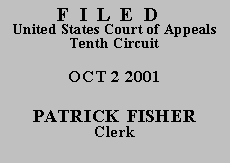

| RAYMOND F. STANSBURY, |
|
| v. | |
| DAVID R. McKUNE and the ATTORNEY GENERAL OF THE STATE OF KANSAS, |
Raymond F. Stansbury, a state prisoner proceeding pro se, requests a certificate of appealability ("COA") to appeal the denial of his 28 U.S.C. § 2254 habeas petition. For the reasons stated below, we deny a COA and dismiss the appeal.
In 1991, Kansas charged Mr. Stansbury with two counts of rape, two counts of aggravated burglary, and one count of aggravated sexual battery. During jury deliberations and at Mr. Stansbury's request, the trial court declared a mistrial as to the charge of aggravated sexual battery. The jury then convicted Mr. Stansbury of one count of rape, while acquitting Mr. Stansbury of the second count of rape and of both counts of aggravated burglary. The Kansas trial court sentenced Mr. Stansbury to ten to twenty years of imprisonment. Mr. Stansbury unsuccessfully sought relief both on appeal and in state post-conviction proceedings.
In 1999, Mr. Stansbury filed a federal habeas petition. Mr. Stansbury contended that 1) the trial court erred in failing to instruct the jury on the lesser included offense of sexual battery, 2) the trial court misapplied several Kansas statutes in permitting the jury to continue deliberations after the court declared a mistrial on a lesser count, 3) the trial court erred in permitting a police officer's testimony regarding the officer's perceptions of the veracity of the complaining witness, 4) the prosecutor committed misconduct by misstating the evidence, 5) Mr. Stansbury's trial counsel was ineffective, 6) the trial court unconstitutionally diluted the 'beyond a reasonable doubt' standard of proof, 7) the evidence was insufficient to support a rape conviction, 8) cumulative error rendered the trial unfair, and 9) Mr. Stansbury's appellate counsel was ineffective.
Noting AEDPA's "contrary to, or... unreasonable application of" and "based on an unreasonable determination of the facts" standards of review, the district court denied relief. 28 U.S.C. § 2254(d)(1) and (2). The district court first noted that the trial court cured the failure to instruct on sexual battery (a lesser included offense of aggravated sexual battery) by declaring, at Mr. Stansbury's request, a mistrial as to the charged aggravated sexual battery. Second, the district court found that Mr. Stansbury's challenge to the application of Kan. Stat. Ann. § 22-3423 amounts to an inappropriate ground for habeas review because the issue is merely one of state law. Third and fourth, the district court reviewed the charged evidentiary error and the alleged prosecutorial misconduct, finding that any error did not render the trial "fundamentally unfair." Dist. Ct. Mem. and Order, at 4-7. Fifth, the district court found that Mr. Stansbury's trial counsel, far from performing below an "objective standard of reasonableness," functioned as a "zealous advocate." Dist. Ct. Mem. and Order, at 7-8. Sixth, the district court determined that the trial court's 'beyond a reasonable doubt' jury instruction did not amount to a violation of due process. Seventh, the district court found that the evidence admitted at trial, viewed in the light most favorable to the prosecution (the prevailing party), was in fact sufficient to sustain a conviction of rape. Eighth, the district court found the cumulative effect of any trial error insufficient to require relief. Finally, the district court found that Mr. Stansbury's appellate counsel did not fail to advance any claim that constituted a 'dead bang winner' and was thus not ineffective.
We construe Mr. Stansbury's allegations liberally, pursuant to Haines v. Kerner, 404 U.S. 519, 520-21 (1972) (per curiam). To be entitled to a COA, Mr. Stansbury must make a "substantial showing of the denial of a constitutional right." 28 U.S.C. § 2253(c)(2). He may make this showing by demonstrating that the issues he raises are debatable among jurists, that a court could resolve the issues differently, or that the questions presented deserve further proceedings. See Slack v. McDaniel, 529 U.S. 473, 483-84 (2000).
We have reviewed Mr. Stansbury's request for a COA, his appellate briefs, the district court's order, and the appellate record; we conclude that Mr. Stansbury has failed to make the required showing for a COA.
Accordingly, for substantially the same reasons set forth in the district court's May 2, 2001 order, we DENY Mr. Stansbury's motion for a COA and DISMISS his appeal.
Entered for the Court,
Robert H. Henry
Circuit Judge
*.This order and judgment is not binding precedent, except under the doctrines of law of the case, res judicata, and collateral estoppel. The court generally disfavors the citation of orders and judgments; nevertheless, an order and judgment may be cited under the terms and conditions of 10th Cir. R. 36.3.